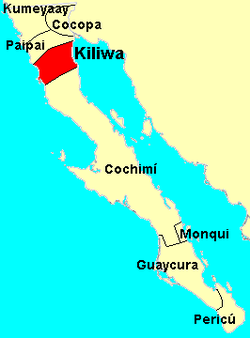Килива
Материал из Википедии — свободной энциклопедии

Килива(исп. Kiliwa) — один из аборигенных народов Нижней Калифорнии в Мексике. На юге они граничили с кочими, а на севере — с племенем пайпай. Традиционная культура основана на охоте и собирательстве.
Племя ньякипа, проживающее на юго-западе этнолингвистической территории килива, этнографы нередко выделяют в отдельное племя.
В 2006 г. племя килива в знак протеста против злоупотреблений и произвола местных властей приняло решение добровольно отказаться от продолжения рода[1].
Язык килива (на котором говорят и ньякипа) относится к семье юма-кочими.
Примечания
[править | править код]- ↑ Contra el Racismo en México: El exterminio de los pueblos del norte. Дата обращения: 14 ноября 2009. Архивировано 4 января 2010 года.
Литература
[править | править код]- Hohenthal, William D., Jr. 2001. Tipai Ethnographic Notes: A Baja California Indian Community at Mid Century. Edited by Thomas Blackburn. Ballena Press, Menlo Park, California.
- Magaña Mancillas, Mario Alberto Gerardo. 1995. «Los ñakipá: grupo indígena extinto de Baja California». Estudios Fronterizos 35/36:205-213.
- Meigs, Peveril, III. 1939. The Kiliwa Indians of Lower California. Iberoamerica No. 15. University of California, Berkeley.
- Michelsen, Ralph C. 1977. «The Construction of a Kiliwa House». Pacific Coast Archaeological Society Quarterly 10(1):39-47.
- Mixco, Mauricio J. 1971. Kiliwa Grammar. Ph.D. dissertation, Department of Linguistics, University of California, Berkeley.
- Mixco, Mauricio J. 1977. «The Linguistic Affiliation of the Ñakipa and Yakakwal of Lower California». International Journal of American Linguistics 43:189-200.
- Mixco, Mauricio J. 1985. Kiliwa Dictionary. University of Utah Anthropological Papers No. 109. Salt Lake City.
- Mixco, Mauricio J. 1996. Kiliwa de Arroyo León, Baja California. Archivo de Lenguas Indígenas de México No. 18. Colegio de México, Mexico City.
- Mixco, Mauricio J. 2000. Kiliwa. Lincom, Munich, Germany.
- Mixco, Mauricio J. 2006. «The Indigenous Languages». In The Prehistory of Baja California: Advances in the Archaeology of the Forgotten Peninsula, edited by Don Laylander and Jerry D. Moore, pp. 24-41. University Press of Florida, Gainesville.
- Moore, Jerry D. 1999. «Archaeology in the Forgotten Peninsula: Prehistoric Settlement and Subsistence in Northern Baja California». Journal of California and Great Basin Anthropology 21:17-44.
- Moore, Jerry D. 2006. «The San Quintín-El Rosario Region». In The Prehistory of Baja California: Advances in the Archaeology of the Forgotten Peninsula, edited by Don Laylander and Jerry D. Moore, pp. 179—195. University Press of Florida, Gainesville.
- Ochoa Zazueta, Jesús Ángel. 1978. Los kiliwa y el mundo se hizo así. Instituto Nacional Indigenista, Mexico City.
Народы Мексики | ||
|---|---|---|
| Имеющие официальное признание |
| |
| Не имеющие официального признания | ||
| Исчезнувшие после европейской колонизации | ||
Text is available under the CC BY-SA 4.0 license; additional terms may apply.
Images, videos and audio are available under their respective licenses.
